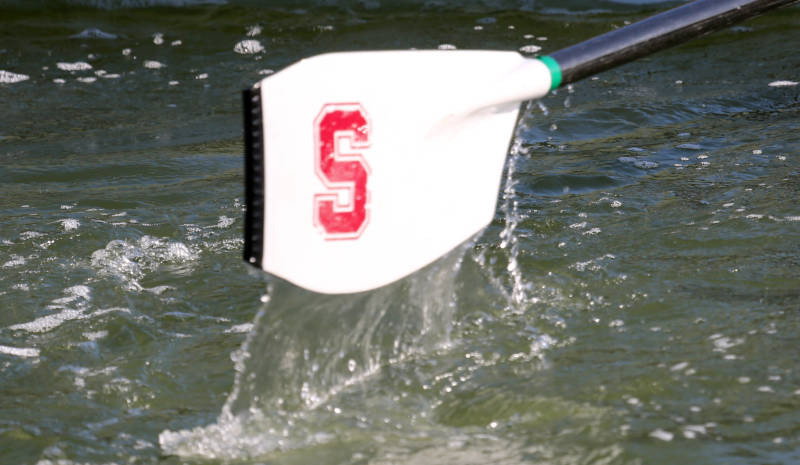STANFORD, Calif.- Adam Kreek never saw it coming.
Having just finished a four-hour shift with Pat Fleming, one of three close friends trying to establish a world record for an unassisted row across the Atlantic Ocean, they had just settled in a small 4x8 sleeping quarter at 2 a.m. when a 25-to-30 foot rogue wave crashed into the 29x6 ocean rowboat, filled it with water, and flipped it upside down.
“It came out of nowhere,” said the 34-year-old Canadian born Kreek, who rowed and coached at Stanford and earned a degree in Geotechnical Engineering and Hydrology. “It hammered us. We were holding on for dear life. One of our oars snapped like a twig.”
This happened last April after 73 days in the Atlantic Ocean, as the group attempted to row from Senegal in West Africa to Miami, Fla. – about 4,100 miles – to set a Guinness World Record.
The boat was called OAR Northwest, a Seattle company that organized the trip, sponsored by the Canadian Wildlife Federation. All four rowers – Kreek, Fleming, Jordan Hanssen and Marcus Pukonen -- were experienced rowers and trained tirelessly for the journey. Kreek competed in the 2004 and 2008 Olympics for Canada and won a gold medal in the latter in the men’s eight in Beijing.
Setting a world record was hardly the sole purpose of the trip. They also had scientific and communications objectives and scientific noted daily readings on the weather, ocean temperature and marine conditions and stayed in contact with a psychologist to discuss sleep patterns and stamina. All of the information was passed on to students across America, Canada and Africa.
The crew witnessed fascinating sights including flying fish, flying squid, thousands of green dorados swimming alongside the boat, lightning storms, swam with whales and witnessed a moonbow, which Kreek described as “a full moon shining through a rainstorm that cast a bow across the sky.”
Said Kreek of the latter: “It was surreal.”
When the boat capsized just inside the Bermuda Triangle, about 400 miles north of Puerto Rico, they piled into a life raft only 850 miles short of their final destination. The U.S. Coast Guard picked up their distress signal and they were rescued by a cargo ship about three hours later. During a typical day, each member of the group rowed for 12 hours.
“It was a lot of work, but the experience made it worthwhile,” said Kreek, now a motivational speaker. “I had some open blisters and sores around day eight or nine, but by day 25, I realized I can actually thrive in this environment. We cooked hot food – rice, beans, fish and dried vegetables – and ate about 5,500 calories the first 60 days and 3,500 the next 40.”
For Kreek, the trip provided two revelations.
“The first was how little you actually need to live in an exorbitant society,” he said. “The second was contemplating the human relationship with the planet. It was very humbling. The ocean doesn’t love or hate you. It’s actually very indifferent.”
Kreek actually started his college career at the University of Victoria. He helped Canada’s men’s eight team win gold medals at the 2002 and 2003 world championships, then competed in the 2004 Summer Olympics. Shortly afterward, Kreek transferred to Stanford and rowed for two years, helping the program gain credibility.
“The program really changed under the leadership of coach Craig Amerkhanian,” said Kreek. “He was able to rally the funds and organized people to build a new boat and a strong environment. We started to achieve a lot of first, beating Cal in the Big Row for the first time; beat Washington; won the Coffey Cup in San Diego; and the year after I left, the guys won the Silver Medal at the Collegiate Championships.”
Kreek grew up in a small town in Canada and had actually never heard of Stanford.
“I was blown away,” he said. “I was impressed not only with the athletics but everything that was happening on campus and the availability of intellectual stimulation for a curious mind.”
“The best thing about Stanford is the community and the people. It’s inspirational through example. It makes you believe you are worthy of doing so many things.”
During his last year on The Farm, Kreek received a number of research credits and built a bio-diesel reactor.
“I am trying to be progressive and carve out a space in the economy for sustainable fuels,” said Kreek. “It’s been fascinating and compelling. You have the deeper motivation of knowing you are contributing to a better world.”
He continues to row, but only for fun and exercise.
“I do it as a hobby,” said Kreek, who was inducted into Canada’s Olympic Hall of Fame in June. “Rowing is a sport that you have to dedicate every ounce of your being if you want to be the best you can at it.”
Sometimes, just to survive.
Please consider making a gift today.













